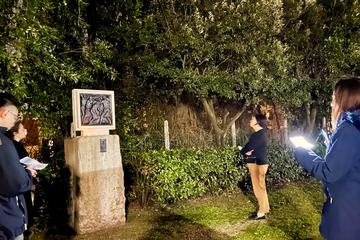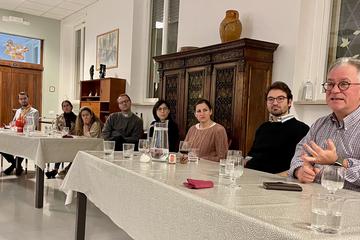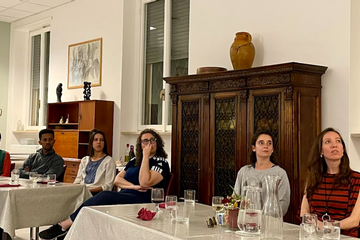
By Elena Dini
ROME — Despite all of the challenges and restrictions due to COVID-19, Lay Centre scholar Olena Shust graduated magna cum laude after successfully defending her licentiate in development and educational psychology at the Salesian Pontifical University in June. The title of her thesis is, “The psychosocial aspects of religiosity in the facilitation of interreligious dialogue and peacebuilding.”
“Writing my thesis during the lockdown was a peculiar experience, above all because it coincided with an eye problem I had that impeded me from working at the computer for three weeks,” said Shust. “Luckily enough, I worked well in advance on my thesis, my moderator was very kind and supportive, and I had no problem submitting it.”
“I’m also very grateful to The Lay Centre’s director, Prof. Donna Orsuto, who provided good conditions here during the lockdown, and who supported and helped me to prepare and organize my defense,” she added.
Shust kept busy during that period by blessing The Lay Centre community with the completion of small chores in the house.
“Since I could not go out because of COVID-19 restrictions or work at the computer due to this eye problem, I did other things. For example, I would keep common spaces clean, which was also very good physical exercise for me, take care of tablecloths, and prepare decorations for our dining tables, like handmade flowers,” she said.
“I have always been very interested in religious topics,” Shust said, referring to her research topic. In her native Ukraine, she was active in two Christian youth communities and received catechetical-theological formation at the Ukrainian Catholic University in Lviv.
Shust learned that the social aspects of religiosity may have positive and negative consequences in society. Negative aspects include prejudice towards people of other religious groups, while positive aspects of religiosity are linked with prosocial behaviour, altruism and charity, mostly practiced towards members of one’s own group.
“According to my research, it is possible to change some wrong perceptions and to increase or neutralize negative effects of prejudice by providing optimal contact, creating a new type of united group,” she stated. This is what Shust called “Us,” instead of “us” and “them”. For example, Christians, Muslims, and Jews could be united under the category of Abrahamic religions, thus creating a new “Us” that would include the members of other religious groups in positive social interactions. In this process, interreligious dialogue and education for peace are considered transformational approaches in interreligious peacebuilding, Shust explained.
Shust said her interest in interreligious dialogue and its link to psychosocial aspects grew while at The Lay Centre, where her experience with people of other religious denominations allowed her to watch some of these theories in action. In particular, Shust admitted, she had held some stereotypes about Muslims before living at The Lay Centre, but her opinion has since changed. She recalled the impact that a visit of Cambridge Muslim College students had on her.
“I understood that, in general, Islam has nothing to do with the activity of some extremist groups, and there are many good people in each religion. Actually, the more information and personal contact you have, the more objective your opinion will be and this will deconstruct some myths,” she said.
“There are many aspects uniting us,” she continued, referring to the relationship between religions, “and we should emphasize those points rather than those issues dividing us.
Shust had earned her PhD in chemistry in Ukraine. However, in attending St. George Cathedral in Lviv, she felt called to serve the Church. She received the blessing and support in this discernment from Archbishop Ihor Voznyak of the Ukrainian Greek Catholic Archeparchy of Lviv.
Interested in the interplay of psychology, theology and Christian values, Shust chose to study at the Pontifical Salesian University in Rome. She appreciated the encouragement and support of rector Prof. Mauro Mantovani throughout her studies in Rome. She fulfilled the university’s requirement for a bachelor’s in psychology with a thesis on the perception of God in light of attachment theory, and she advanced to the licentiate. Shust now intends to pursue another PhD in psychology.
Photo courtesy Olena Shust


